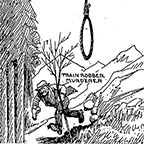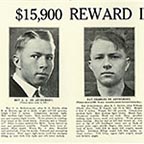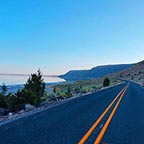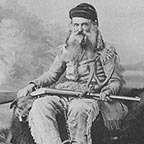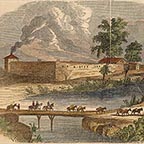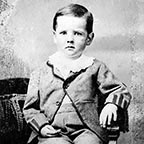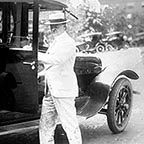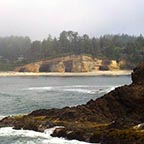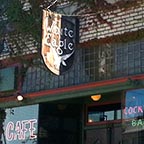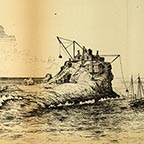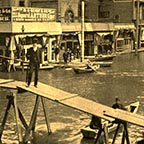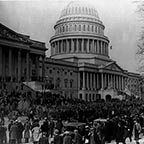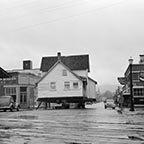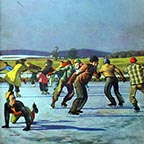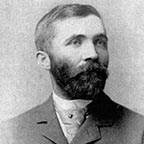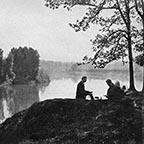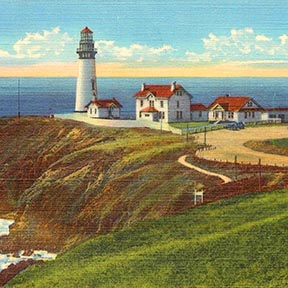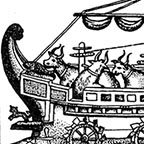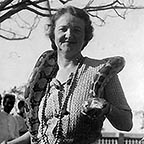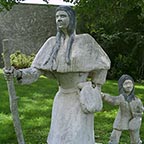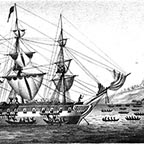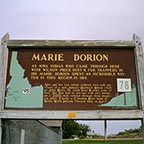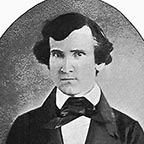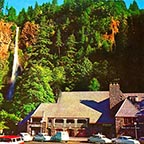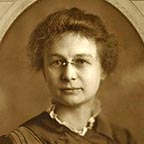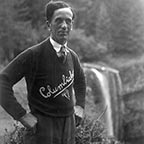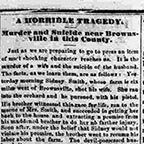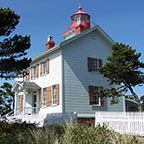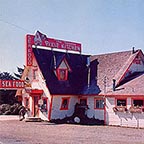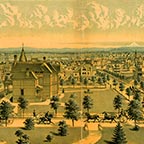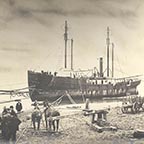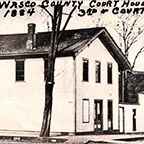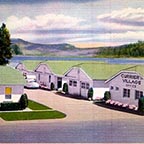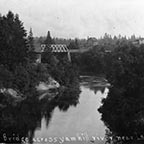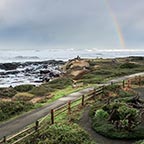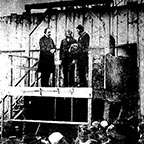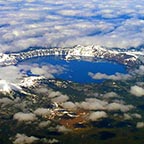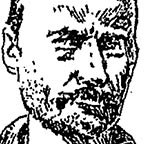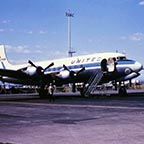2017
columns:

Welcome! This is the browsing page for articles published in 2017. You can read the brief description of each and decide if you want to continue ...

Last “great” train robbery was a brutal, incompetent fiasco (#424, January 1, 2017)SISKIYOU PASS — After several other attempts to get into the crime business didn't work out for them, the DeAutremont brothers came up with a plan to rob a train at the summit of the Siskiyous. It did not go well — for anyone involved.
|
Bungled train robbery-murder solved with “CSI: Southern Oregon” (#425, January 8, 2017)ASHLAND — College professor's forensic investigation fingered the DeAutremont Brothers in the brutal robbery; after a years-long manhunt, and more than 2 million “wanted” posters, they were caught. But we still don't know the full story.
|
Oregon’s biggest mud puddles are once-and-future inland seas (#426, January 15, 2017)LAKE COUNTY — Summer Lake, Abert Lake and Goose Lake were once all part of a vast network of seas surrounded by lush vegetation. In dry years they can evaporate completely — which led to some confusion on the Applegate Trail one year.
|
Quest for “Blue Bucket Mine” led “suckers” to actual riches (#427, January 22, 2017)BLUE MOUNTAINS — As a historical account, the Lost Blue Bucket Mine story is, to put it mildly, questionable. But there can be no denying the impact it has had as a legend, repeated and believed by generations of Oregonians.
|
Story of sinister “Polybius” videogame almost certainly a myth (#428, January 29, 2017)BEAVERTON — The darksome story of the old console game, with its attendant Men In Black and swarms of zombie children, is a fun story to look back on; but its odds of being true are up there with tales of Bigfoot.
|
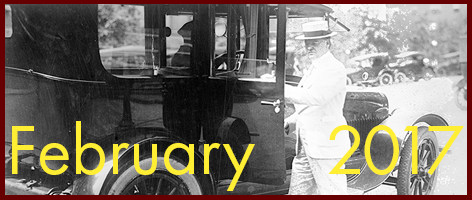
California Gold Rush was sparked by a failed Oregon farmer (#429, February 5, 2017)SUTTER'S MILL — Had James Marshall stayed in Oregon for one more month, he likely never would have left; instead, he headed south and found gold. And the discovery led more or less straight to his ruin.
|
Tiny, lonely Newberg orphan grew up to be President (#430, February 12, 2017)NEWBERG — He arrived in Oregon at age 9, and people called him “Poor Little Bertie.” He left Oregon for good to go to college at Stanford when he was 17. But Herbert Clark Hoover remained a member of the Salem Quaker church until his death.
|
Former Oregonian saved whole nations from starving to death (#431, February 19, 2017)SALEM — When World War I broke out, Herbert Hoover was the world's most successful mining engineer. He abandoned all that to build an organization to feed the starving, first in Belgium and then throughout war-torn Europe.
|
How A.C. Gilbert, the “anti-Grinch” from Oregon, saved Christmas (#432, February 26, 2017)FOREST GROVE — When Salem native Alfred Carlton Gilbert, inventor of the Erector Set, learned that government officials were going to cancel Christmas with their “Buy Bonds, Not Toys” campaign, he went to Washington to change their minds. He did.
|

Pirate, jailbird, swindler, tycoon: “Colonel” T.E. Hogg and his railroad (#433, March 5, 2017)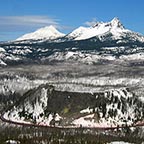 SANTIAM PASS — Desperate for some ready cash after his steamer wrecked on the beach, the would-be magnate hastily built a “railroad to nowhere” over Santiam Pass in an attempt to swindle the federal government. It probably would have worked, but ...
|
Did Sir Francis Drake actually visit Oregon in 1579? (#434, March 12, 2017)WHALE COVE — Let's face it: No one actually knows where the famous English privateer and explorer spent the summer, and his notes, upon his return, were deliberately opaque. But it's possible that his “Nova Albion” was on the Oregon Coast.
|
“The Bucket of Blood” saloon: A souvenir of the age of shanghaiing (#435, March 19, 2017)EAST PORTLAND — East Portland's White Eagle Saloon has a colorful past. Over the years, it's been local headquarters for the Polish Resistance, a rough watering hole for sailors and dock workers, and Portland's hottest blues and rock-and-roll hot spot.
|
Even as a boy, Erector Set inventor seemed larger than life (#436, March 26, 2017)SALEM — A.C. Gilbert was a practicing magician good enough to astonish Hermann the Great at age 7, a world-record-holding athlete at age 17, and a born salesman — in the best “win-win” sense of the word.
|

Ashland’s Shakespeare Festival kayoed boxing event in Round One (#437, April 2, 2017)ASHLAND — The city business leaders hoped the Shakespeare Festival would do OK, but just in case it tanked, they insisted that it share the stage with a series of prizefights. The boxing matches bombed badly; luckily, the Shakespeare plays did not.
|
Lighthouse was built 18 days too late to save sailing ship’s crew (#438, April 9, 2017)TILLAMOOK ROCK — The construction crew had knocked off work for the night, and outside the building the blustery January weather raged. Then, over the roar of wind and surf, the crew heard a terrified voice from below shouting, “Hard aport!”
|
When old Portland flooded, people just raised the sidewalks (#439, April 16, 2017)PORTLAND — In 1861, the worst floods in state history turned the Willamette Valley into one giant half-million-acre lake and swept several burgeoning towns away. And, despite our flood-control dams, someday it will probably happen again.
|
“Bonus Army” populist uprising started in Portland, ended Hoover's hopes (#440, April 23, 2017)EAST PORTLAND — Portlander Walter Waters arrived in D.C. at the head of 20,000 disciplined, well-intentioned petitioners to request that First World War vets be paid their service bonus early. Hoover refused to meet with him — a big mistake.
|
Cottage Grove’s revenge for failure of “Nesmith County” plan was savage (#441, April 30, 2017)Eugene city leaders campaigned hard at the ballot box to stop South Lane County from seceding, and the plan to create a new county was defeated. A year or two later, the embittered south-county used the same ballot box to get even.
|

Aircraft Warning Service saw few enemies, but saved many friends (#442, May 7, 2017)OREGON COAST — Although Oregon turned out to be harder for the Japanese navy to reach than folks thought, historian Bill McCash estimates the civilian plane-spotting service likely saved as many as 100 American aviators from dying in plane crashes.
|
Mount Hood: So mild-mannered, you forget it’s still an active volcano (#443, May 14, 2017)MOUNT HOOD — Back when the Mazama Club formed, with membership open only to those who had climbed old Wy’East, standing on top of the mountain meant more than it does today. Just 35 years earlier, fire had been belching out of it.
|
One cold snap taught a town to ice-skate; another sank a steamship (#444, May 21, 2017)WILLAMETTE VALLEY — When the mercury dropped below 20 degrees for six weeks, a six-inch layer of ice formed on many Willamette Valley lakes — and locals took up ice skating. And five years earlier, it got so cold, a newly built steamship actually cracked in half.
|
Oregon was scene of Soapy Smith’s first documented soap swindle (#445, May 28, 2017)SKAGWAY, ALASKA — The most famous con artist of the Old West started in Portland, then traveled throughout the state working the “marks” with his signature swindle. Fifteen years later, an Oregonian shot him in a gun fight in Skagway.
|

Oregon Governor Geer is state’s “patron saint of bike commuters” (#446, June 4, 2017)CHAMPOEG — Hopping on an old steel one-speed and pedaling 30 miles, then mowing a half-acre of lawn with a push mower, chopping down an oak tree twice, and riding 30 miles back again — it was all in a weekend's work for Gov. T.T. Geer.
|
How Cape Foulweather Lighthouse got built on the wrong headland (#447, June 11, 2017)NEWPORT — Today known properly as Yaquina Head Light, the state's tallest lighthouse is a popular tourist attraction, and the home of the nation's only wheelchair-accessible tidepools.
|
How a Corvallis man learned that cows make lousy boat engines (#448, June 18, 2017)CORVALLIS — The "Genius of Corvallis" hoped his cattle-powered riverboat would give the upper-Willamette sternwheelers a run for their money; and so it did, so long as it didn't try to go upstream . . . .
|
Wild West bearcat Mona Bell: Annie Oakley with an edge (#449, June 25, 2017)BONNEVILLE — Although she's most remembered for being the mistress of a famous man, journalist and rodeo performer Mona Bell Hill was, on her own, one of the most interesting people ever to live in Oregon — and, to the government, one of the most vexing.
|

Little-known Native Marie Dorion was a wilderness-survival ninja (#450, July 3, 2017)As the Native American bride of a French-Canadian interpreter, she joined the Astorian Party on its overland voyage to Oregon to set up a trading post on the Columbia River. Did she know what they were getting into?
|
Astorian Party’s decision to follow the river was nearly fatal (#451, July 9, 2017)Charged with blazing a trail to the West Coast, the voyageurs in the party decided to paddle down a strange river, hoping for an easy ride to the sea. Only the charity of local Native American tribes saved them all from starvation.
|
How Marie Dorion earned her story as “Oregon’s Revenant” (#452, July 16, 2017)Marooned in a frozen winter wasteland after a hostile tribe attacked and killed everyone else, she kept herself and her two children alive through the winter and then led them home to safety.
|
Colleague's taste for dead-lizard-infused booze ruined early naturalist’s specimens (#453, July 23, 2017)Stranded for the winter on Sauvie Island, the members of Nathaniel Wyeth's trading post struggled to get enough to eat. But for some of them, the greater problem was finding something to drink.
|
Various schemers’ plans to exploit Multnomah Falls came to naught (#454, July 30, 2017)Original owners of the falls tried for years to log it, but the steamship and railroad moguls were making a lot of money on excursion trips, so they blocked the scheme, preserving the falls for today's park.
|

When the governor’s secretary imposed martial law on three saloons (#455, August 6, 2017)Don't be fooled: Fern Hobbs was a secretary in the “Secretary of Defense” sense of the word. A practicing attorney, she was the highest-paid woman in public service. Copperfield's city fathers thought they could charm her ... they were wrong.
|
How Bob Straub stopped a plan to run Highway 101 on the beach (#456, August 13, 2017)State treasurer Straub was a regular visitor to the state park through which the highway department wished to route the main Oregon Coast arterial. He took one look at the department's plans — and declared war.
|
“Daredevil Al” Faussett was the Evel Knievel of the 1920s (#457, August 20, 2017)The former logger tried to cash in on his knack for boat design and total lack of normal fear by paddling over waterfalls: Willamette Falls, Celilo Falls, South Silver Falls. But although he got famous, he never managed to get rich.
|
Frontier Oregon murder case was more complicated than it appeared (#458, August 27, 2017)When first reported, it looked like a simple murder-suicide. But it quickly became clear that it was something far more sinister — and the motives of the killer were uglier and more sordid than anyone had thought possible.
|
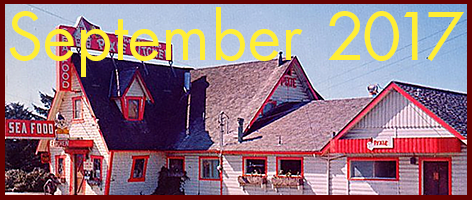
Ghost may never have existed, but she saved Yaquina Bay Light nonetheless (#459, September 3, 2017)But did Lischen M. Miller create the story of Muriel Trevenard, the mysterious young woman who came to Newport in the 1870s and vanished ... or did she merely write down a story that locals whispered to each other on stormy nights?
|
Grande Ronde Valley: Oregon Trail’s Eden, used-oxen dealership (#460, September 10, 2017)The little pocket of temperate, well-watered land, tucked into some of the most inhospitable territory on the trail, was a real lifesaver for many an emigrant. But, that didn't stop them from griping about the prices they were charged ....
|
Memories of Pixieland: High-water mark of Oregon’s postwar-timber-era culture (#461, September 17, 2017)Jerry and Lu Parks envisioned a “fairy-tale history of Oregon” in the form of an amusement park. What they created was a rich cultural artifact, and a treasured childhood memory for a generation of Oregonians.
|
Murderer learned “Unwritten Law” doesn’t cover killing one's brother-in-law (#462, September 24, 2017)“Amsterdam Jack” Murray claimed it was all a misunderstanding, but the jury obviously suspected he'd intended to murder his wife's brother all along; then the appeals court learned he was a bigamist to boot.
|

To get back to sea, beached ship had to “sail” through the woods (#463, October 1, 2017)The salvage bid was won by a house-moving company from Portland, which, rather than trying to pull the stranded Columbia Lightship off the beach, built a road, trucked it over the peninsula, and launched it in Baker Bay.
|
James Cook was Oregon’s “International Murderer of Mystery” (#464, October 8, 2017)He called himself James Cook, and spoke with an English accent. But when asked about his past, he spun fanciful and ever-changing stories full of world travels, tiger hunts, shanghaiings and the like; he went to his death a total enigma.
|
Little-known Lakeside resort was packed with Hollywood stars (#465, October 15, 2017)After making a fortune pushing patent-medicine tablets, Roy Currier cashed out and used the money to build a tidy, discreet little fishing resort on Tenmile Creek — with gourmet cuisine, great fishing, and a little illegal gambling action.
|
Brutal 1886 Lafayette ax murder couldn’t have been much more sordid (#466, October 22, 2017)Richard Marple likely would have been acquitted for lack of hard evidence if he'd been able to keep his mouth shut. But, maybe he figured there was nothing he could do to keep folks from eventually learning his family's dark secret.
|
Parks department’s aggressiveness cost Yachats its beach access for 10 years (#467, October 29, 2017)Eager to get started on Smelt Sands Park, the state forcibly vacated Lincoln County's right-of-way on its 804 Road along the beach, and beachfront property owners quickly fenced it off. It took a 10-year legal battle to fix the problem.
|

Was Lewis O’Neil a murderer, or did he just take the rap for one? (#468, November 5, 2017)Everyone in Ashland knew Amanda McDaniel and Lewis O'Neil were having a little affair; so, when Amanda's husband turned up murdered with O'Neil's shotgun, it seemed obvious what had happened. But ... was it?
|
Car chase at Crater Lake ended with an exploding hand grenade (#469, November 12, 2017)A German man, running from the law in a stolen Volvo full of guns and fake IDs, apparently dropped the hand grenade he was preparing to throw at the pursuing officer and was unable to retrieve it in time.
|
Vigilante’s gunfight left three neighbors dead and a fourth hanged (#470, November 19, 2017)Although everyone agreed the Mache family had had it coming, evidence at the scene convinced the sheriff that Kelsay Porter had ambushed them in cold blood, and the jury sentenced him to swing for it.
|
Portland-bound airliner was blown out of the sky for insurance fraud (#471, November 26, 2017)Jack Graham had planned for the airliner to explode over the Wyoming mountains; but the plane got out late, and the bomb went off a few minutes after takeoff — while he sat with his wife and son in an airport cafe.
|

Hawaii-bound flight out of PDX ditched in open sea (#472, December 3, 2017)Lessons learned in the crash ended up saving countless lives in subsequent at-sea ditchings, but those lessons came at a price: Four people died, including the co-pilot who had saved everyone's life.
|
Klamath Falls airport had an unusual run of bad luck (#473, December 10, 2017)In the past 75 years, there have been only four lethal commercial-airliner crashes. By an odd statistical fluke, two of those happened to planes flying out of the airport in Klamath Falls.
|
Oregon’s worst-ever plane crash is also its most mysterious (#474, December 17, 2017)West Coast Airlines Flight 956 was a brand-new DC-9; the airline literally bought it on Monday and crashed it on Saturday. It hit a mountain while flying calmly along, 5,000 feet too low. But, no one has been able to figure out why.
|
Lessons from Christmastime plane crash are still saving lives today (#475, December 24, 2017)The pilot got so caught up in trying to figure out what was wrong with the landing gear, the plane ran out of fuel — while the flight crew bit their tongues for fear of being insubordinate. A new crew management system was the response.
|
Two fatal airliner crashes made 1933 a rough year for Oregon aviators (#476, December 31, 2017)A Ford Trimotor crashed on takeoff in Eugene, and a twin-engined Boeing crashed into the west hills of Portland, within 11 months of each other. Miraculously, there were survivors in both events.
|
©2017 by Finn J.D. John. Copyright assertion does not apply to assets that are in the public domain or are used by permission.
